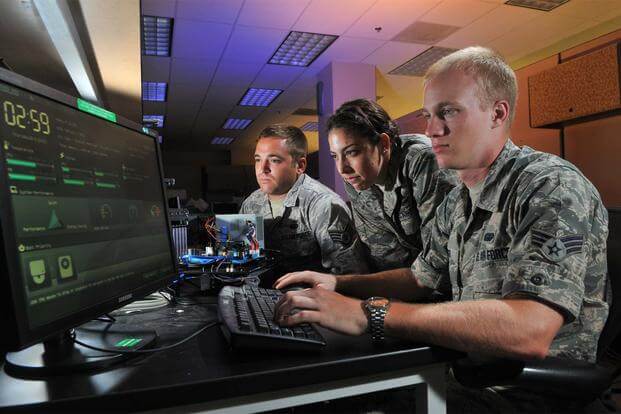Brig. Gen. Patrick Higby is director of Cyberspace Strategy and Policy, Office of Information Dominance and Chief Information Officer, U.S. Air Force. The opinions in this column are his own.
Imagine this scenario: America is at war and it's getting messy. Our enemies exploit cyber vulnerabilities, inflicting severe losses on our economy and national security without fear of consequence or reprisal.
Should the country explore every available response, whether under the confines of current law or through new methods to unleash the untapped potential from private citizens, communities and corporations?
Fears of an "electronic Pearl Harbor" have been with us for more than a decade, and threats to American cyber security grow more profound by the day.
In recent years, foreign hackers have infiltrated everything from government networks and databases to banks, movie studios and political organizations. Just recently, Defense Secretary James Mattis noted a significant increase in the hacking of NATO country databases during recent years.
In addition to the traditional approaches to countering cyber threats, perhaps it is time to start thinking unconventionally about safeguarding our electronic infrastructure and, more importantly, our data. There is, after all, a long-standing tradition of American pragmatism and ingenuity used to turn the tables on our adversaries and leverage the private sector.
America's most famous example of "privateering" came in June 1812, when our young nation was at war with Britain.
Our Navy fielded perhaps a dozen ships. Britain's battle-hardened Royal Navy boasted over 500 warships, with 85 of these operating in American waters when the War of 1812 broke out.
Something was needed to quickly even the odds as the Royal Navy pummeled our commerce and interdicted our harbors.
Enter the privateers -- armed private ships manned by civilian crews motivated by patriotism and profit. These brave sailors were given Letters of Marque as authorized by Article 1 of our Constitution and constrained under an admiralty court to seize British ships as prizes. These actions bolstered the meager U.S. Navy and allowed private citizens and corporations to actively fight back to inflict great consequences upon our adversary.
Today, our nation is at war with many non-state actors, including the Islamic State, who are leveraging social media and the dark web to further their repugnant objectives.
A recent article in "The Atlantic" magazine by Emerson Brooking and Peter Singer outlined the problem: "While the Islamic State has shown savvy in its use of social media, it is the technology itself -- not any unique genius on the part of the jihadists -- that lies at the heart of the group's disruptive power and outsize success. Other groups will follow."
That innovation in exploiting the new cyberspace domain should not be confined to our adversaries. We can just as easily unleash American ingenuity in service of national interests without having to resort only to traditional military options.
We are suffering significant losses in cyberspace as savvy enemies continue to hack government databases and other critical infrastructure without fear of real or immediate consequences.
The continued message of using strictly military solutions, technology-based defenses and cyber hygiene alone will no longer suffice.
As was the case with our privateers, American citizens, communities and corporations must be empowered to fight back and inflict more immediate and unpredictable consequences upon our adversaries to change the calculus.
Today's challenges call for no less ingenuity than those faced by previous generations.
-- If you would like to submit your own commentary, please send your article to opinions@military.com for consideration.



























